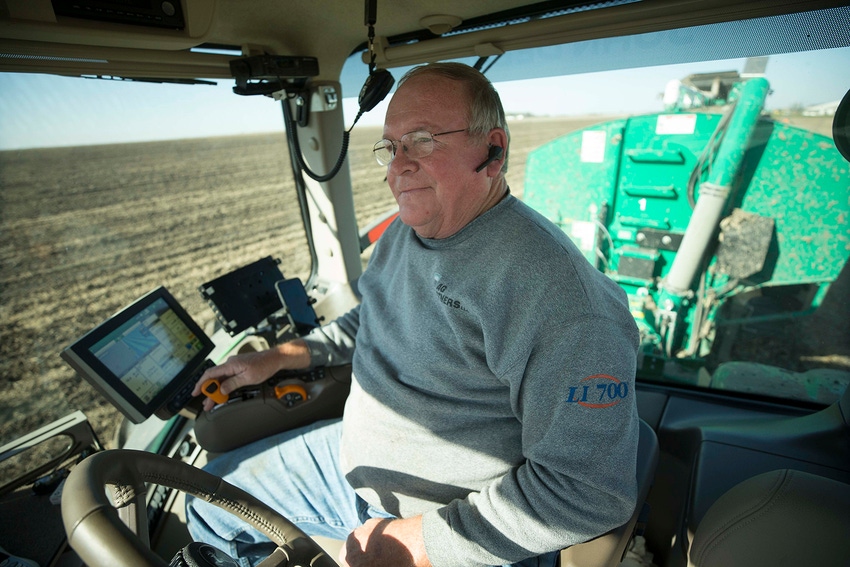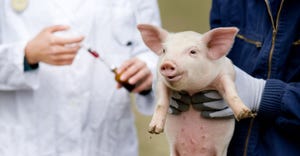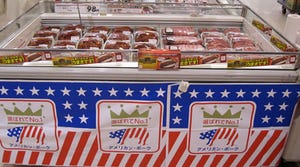Partnerships for Climate-Smart Commodities sign-up to begin soon
Active partnerships include three pork-related projects from National Pork Board, Accelerating Appalachia and Fischer Farms Natural Foods, LLC.

Pork producers interested in participating in the USDA's Partnerships for Climate-Smart Commodities program will soon have the chance to sign-up for several opportunities. This week USDA kicked off the implementation phase for the 141 projects funded through the $3.1 billion effort.
"Farmers, ranchers and forest landowners are on the front lines of climate change. At the same time, they are uniquely positioned to deliver climate solutions through climate-smart production that reduces greenhouse gas emissions and sequesters carbon," said Agriculture Secretary Tom Vilsack. "Through these projects, our partners are working to create new markets for climate-smart commodities, while developing the tools needed to quantify impacts and help producers implement climate-smart practices on their land. We're excited these projects are getting underway and look forward to achieving meaningful results for producers, agriculture and forestry economies and our climate."
In the coming weeks and months, partners will be opening sign-up under their projects for producer participation. Producers interested in participating in projects are invited to visit the Partnerships for Climate-Smart Commodities Active Projects Dashboard to find projects in their areas. The dashboard will be updated periodically with newly active projects and links to their project websites when available.
Three pork-industry related projects are included in the program:
National Pork Board's Advancing U.S. Pork Sustainability and Market Value Proposal - Iowa, Minnesota, Missouri
Pork, soybeans, corn
Approved Federal Funding:$20,000,000; Non-Federal Match:$15,100,000
The goal of this project is to increase the sustainability of U.S. pork products by advancing climate-smart agriculture practices within the feed supply, thereby maintaining market demand and price premiums in a rapidly evolving consumer world.The geography of focus–Minnesota, Iowa and Missouri – encapsulates a concentration of pork facilities supported by local grain production, representing a key region of the overall supply chain.
Planned practices include cover crops, livestock integration in cover crops and manure management. The project plans to offer participants, including small-scale and underserved producers, free initial soil testing, technical assistance from partner agronomists, cost-share for practice adoption and tuition or scholarships for participating producers to attend advanced soil health training workshops through peer-to-peer networking.
The proposal plans to deploy a Sustainable Environmental Consultant's Ecosystem Practices software platform which uses the COMET-Farm GHG tool and Nutrient Tracking Tool for estimating Soil Organic Carbon stock changes, Nitrogen Oxide emissions, and nutrient and sediment losses, and use soil sampling to benchmark results. The project plans to utilize a number of processes to ensure adoption of practices, including precision farm data, work orders, seed purchase receipts, tagged images, remote sensed analytics, on-farm field inspection, and GHG results are planned to be aggregated from a field basis to the required spatial domain and will be delivered through dashboards and reports.
Once published the quantified GHG benefits of U.S. pork and all the continuous sustainability improvement information derived through this project may be used by many entities, organizations and companies marketing pork globally. The project plans to support farmers to market their climate- smart commodities in a manner that best suits their production system and individual operation goals, empowering and incentivizing continuous improvement over the long-term (even after the grant is complete) including if they choose maturing environmental offset markets while also providing communications capacity to engage both
producers (supply) and end-of-supply chain consumers (demand) in marketing resulting commodities and potentialvalue-added.
Accelerating Appalachia- Building Soil, Building Equity: Accelerating a Regenerative Farming Movement in Appalachia and the Southeast
Fruit and Vegetables, Row Crops, Beef, Pork, Cotton, Wool and Specialty Crops
Approved Federal Funding: $20,000,000; Non-Federal Match: $2,193,215
This project seeks to build climate-smart markets and sequester carbon over thousands of acres of Appalachian and rural southeastern land through strategic recruitment from networks of producers. The project will use education, outreach, technical assistance and incentivizing producers to adopt climate-smart agriculture.
COMET-Planner will be used to determine estimates of activity impact on GHG, COMET-Farmer will be used to build out a historical and plot specific report. Soil carbon testing, through Kansas State University, will allow producers to monitor increases in soil carbon sequestration over time in their climate-smart implementation plots, and Working Trees, a venture out of Stanford University using smartphone cameras and LiDAR, satellite remote sensing, and machine learning to empower producers to monitor the carbon impact of agroforestry efforts.
Fischer Farms Ultimate Beef Strategy- Indiana, Kentucky
Beef, pork
Approved Federal Funding: $15,000,000; Non-Federal Match: $7,913,094
This project aims to generate knowledge of carbon sequestration and greenhouse gas emissions for the Fischer Farms beef production system, to inform future business decisions, and to generate science-based marketing tools that will enable buyers to actively participate in climate-positive purchasing and eating decisions.The project will include livestock producers, and it will support Fischer Farms' market expansion into other areas.
The project will utlilize Dual Comb Laser Technology for measuring all greenhouse gas benefits. Rigorous sampling, first-of-a-kind monitoring and innovative analysis will lead to a new science-based understanding of the potential to deliver beef to the market that is truly a climate-smart commodity. This novel laser technology is planned to measure methane and other greenhouse gases at both the barn lots and pasture setting at Fischer Farms network farms.This approach will provide detailed measurements of beef cattle GHG emissions on pasture and allow for the quantification of the impacts of algae feed supplement on reducing methane emissions with the Ultimate Beef production system.
While project partners are currently working on formal implementation of the climate-smart production practices, marketing, and quantification, monitoring, reporting and verification of greenhouse gas benefits, the USDA has launched the Partnerships for Climate-Smart Commodities Learning Network, a collaboration of all the project partners, which will generate key lessons-learned as projects are implemented.
About the Author(s)
You May Also Like





